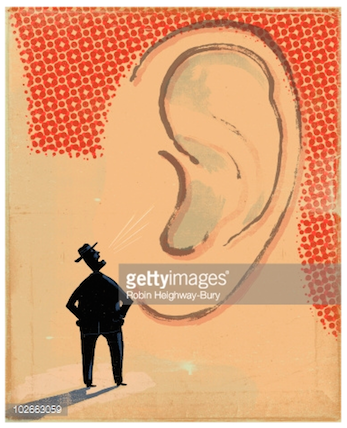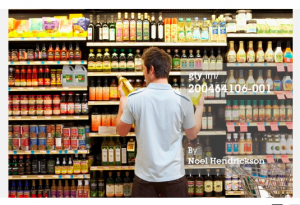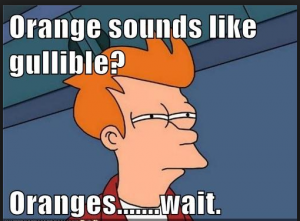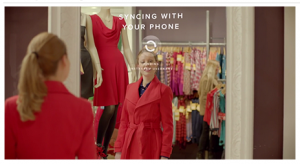 ICYMI – According to Whiteops: Methbot a Russian run ad scam has made over USD $3-5 million per DAY over the past month amounting to over $200M in fraudulent ad revenue by tricking algorithms and mimicking legitimate US web traffic. Though this is an expensive and temporary hiccup (some advertisers who have identified the fraud traffic have gotten their money back), it is one that has gotten the attention of the big players and will hopefully lead to a stronger online ad bidding system with greater transparency and increased efficiency. That said, one of the key takeaways for me is the over reliance on automation and the lack of relationship based selling in the ad space. There will always be imposters when the transactions are automated and the players are not vetted. Not to mention that automation is an oft used reason to explain away poor due diligence.
ICYMI – According to Whiteops: Methbot a Russian run ad scam has made over USD $3-5 million per DAY over the past month amounting to over $200M in fraudulent ad revenue by tricking algorithms and mimicking legitimate US web traffic. Though this is an expensive and temporary hiccup (some advertisers who have identified the fraud traffic have gotten their money back), it is one that has gotten the attention of the big players and will hopefully lead to a stronger online ad bidding system with greater transparency and increased efficiency. That said, one of the key takeaways for me is the over reliance on automation and the lack of relationship based selling in the ad space. There will always be imposters when the transactions are automated and the players are not vetted. Not to mention that automation is an oft used reason to explain away poor due diligence.
Using science for marketing goals.

Ever seen a person act irrationally. Well there might be a simple age old answer to that.. behavioral bias.
Marketers can take advantage of a hardwired ancient bias in all human beings. Which for one associates a great weight on losses versus gains. Ever wondered why fear is a greater sales agent than happiness, wonder no more.
Ever wondered why we prefer half a gift right now rather than one tomorrow but if offered the same gift in the future with a one day delay for half vs full gift we prefer to wait the extra day in the future. Defies logic doesn’t it.
The evolutionary answer would point towards the fact that mistakes could easily lead to death in prehistoric times (before we had a written history that might assist in remedying mistakes) and hence our minds are hard wired and allocate a greater importance to errors as a survival mechanism.
Why we do what we do and why it doesn’t always make sense!
Our hard-wired ancient behavioral biases make us act in irrational ways but once understood they can be used to influence decision making. E.g. Losses have a greater impact on our decision making than gains. To quantify it we need twice as much of a gain to offset half as much of a loss. This is a relic of the fact that in prehistoric times, mistakes could easily lead to death and hence our minds have been evolutionarily coded to allocate a greater emphasis on remembering mistakes and avoiding them in our decision making. For marketers that translates as fear is a greater sales agent than happiness.
News Media and Confirmation Bias

I read an interesting study the other day on confirmation bias and how our minds pay more attention, way more attention to stories that re-inforce our biases.
We encounter a lot of stories in our daily lives whether through the news, friends, families, overheard on the bus/train, stories are all around us but we don’t remember all of them because we don’t pay the same amount of attention to all of them.
So which ones do we pay attention to and why? Well according to research we pay attention to those that are obviously more compelling and that is based on a combination of variables – the structure, the characters, the storyteller but one of the other variables is that we pay attention to those stories that reinforce our bias.
E.g. We have the TV playing in the background and there are multiple stories being told some are in ads, some are in news bites but once in a while we get pulled away from the work we are doing and notice a particular story.
This could be confirmation bias – our mind is actively searching for content which will validate our world view. E.g. If we believe Black-on-Black crime is a real thing and a major cause for the high levels of violence in the black community as opposed to other indicators such as income, family structure, living conditions, neighborhood etc. then we are drawn to stories that repeat that narrative. Whereas a story about white crime in a low income similar scenario is not as readily picked up and remembered by our minds.
This leads to a situation where our mind has a lot of stories to re-inforce our bias and few to challenge them, so we become more and more biased to where it becomes our opinion and slowly our belief.
This can be seen in the current cable news environment. Though there may be stories that work against a particular network’s stance they are not given airtime because they do not reinforce the bias of the viewers. Biases which the channel might have encouraged and nurtured in the first place. Also there is the fact that if a channel runs too many stories that challenge the biases of its viewers it loses credibility with them and is seen as not reporting the “right” news. If you are a FOX viewer, you want to see stories that tell you there is an immigrant epidemic so stories about immigrants becoming successful through hard work or immigrants not on the government social welfare programs lessens your faith in the channel. Similarly stories that highlight how diversity benefits america and stories of how new immigrants have helped the economy these stories though anecdotal (and most news stories are) will disengage the channels audience and they will look for other news sources. The same can be said of MSNBC or left leaning news.
This has lead to an environment where the news channels instead of educating their viewers are enabling them. So not only do advertisers have an influence but the viewers biases have a profound impact too the content because channels operate on TRP’s and so they give the viewers what they think they want based on their customer profiles and biases.
The problem here is that editors choose news stories based on probable viewership numbers and viewers wants news that enforces or validates their world view. It’s a vicious cycle that makes us all more polarized, biased and discourages independent thinking along with making us less informed about the true state of things.
Also how are we to grow as a society if the sources we look to for truth, pander to our lowest base instincts and enable our biases further for the sake of revenue. I do not have a solution – apart from check your biases, analyze every bit of information and engage in independent thinking.
The morality of online behaviour data

When does going through someones online history start becoming online voyeurism?
Now I know this is a stretch but in all honesty it’s something that keeps creeping up when I am behind the scenes looking at data. I recognize that it is aggregated data and not specific to individuals which protects identity and saves against bias. That said, I think it’s too early for consumers to be alarmed by it, but as we start to live more of our lives online this debate and the laws to limit marketers access to data are not too far away.
If good marketing means the ability to comb through peoples online behavior data and find patterns and insights so as to conclude their next steps and their buying pressure points.
Then it to some extent requires the same skills that would make a good voyeur. The ability to go undetected, being one of them, because no one wants to know they’re being watched but it also involves deducing their next steps so that we can intercept them with our products and make it seem like a helpful coincidence.
Is online data snooping or observing? Online behavior is not done in the public realm so it can’t be observing and if it isn’t then is it snooping?
So go forth and snoop! #BuyBehavior #InsightMiner
Why we’re all taught to like the same thing, Or at the least within a range of things.

From early childhood we are made to aspire towards the same goals and covet the same things. Individuality is encouraged but within confines. It is a false acceptance of Individuality because in reality true individuality is discouraged and sometimes literally beaten out of people.
The Mantra can be rephrased as – Be the best that you can be (do the most that you can do) vs. do whatever you want to do.
The individual self is a threat to the mass produced nature of the corporate complex. Individuality means variety, but the systems of mass production can only profit on large numbers of the same objects — A limited range of desire is required and hence a conformist desire is projected.
E.g. Forget getting to design your own car you can’t even pick any color. You can only pick colors from those offered by the car company. Now sure you can get it painted in any color you like.. but why not then sell a blank car at a discount. Do I hear the universal echo of “economies of scale” being shouted by business people everywhere, not to mention law enforcement that might need to describe the color etc.
This seems practical and it is.. for products though not for people. The thought that a range of options is the same as true individuality when made towards a lifestyle and choice of career is what is truly stifling for the human condition.
This is the case because if we did not in some way confuse conformist desire with true desire we would see through the mirage that is consumerism and its promise of fulfilling our inner desires with products.
Hence we are confused into thinking we are individuals when in reality we are being cajoled into conforming to pre-molded roles that can then be categorized, segmented, marketed to and finally capitalized on.
Think Differently
When Product overtakes Soul – Are brands better liked than people?

As Icing on the cake of how consumerist we’ve become is an interesting new study by Innocean which highlights how the carefully managed personalities of brands are winning the likeability race against their very creators. People are preferring brands over humans!
This raises some interesting questions – Is the collective better than the individual.
Considering that brands are managed by a group of individuals who are all trying to do the best thing for the brand and hence cancel out each others bad decisions.
When we covet thy neighbors product! Are Products what we covet over companionship?
This is a trick question because the answer is in a gray area. We prefer some products over some people. But no product can even come close to those we genuinely love. I guess in a nutshell we’d all trade a bad friend for an apple product.
Thought Provoking none the less.
Click here to read the article.
Is there a social media saturation point?

Social Media survives on people living and announcing loudly their lives on all the different platforms for that is the content that people log in for. The whole thing relies on people announcing the good and the bad thats going on in their lives for the amusement and bemusement of others, which is ok for kids who have little concept of privacy or need for it but as you age privacy becomes more important and making all your decisions and whereabouts public becomes more expensive (employers, family, people whose opinion matters) e.g. partying pics, too many selfies, regular bar check-ins, drunken status updates they can come back to haunt you.
Now there are those who would argue that in todays age even bad behaviour is acceptable and quite de rigueur if you want to stand out from the clutter. This is suitable for celebrities and reality TV stars but for working professionals it can be the death knell.
Already we are seeing a tapering off from social media usage because of perceived fallout and user burnout. Not everyone is reliving their partying days (or nights) as vociferously as they were before as a result of the reality that your employer might have access to the same information. Does this mean social media is close to its saturation point?
Naysayers would argue that Humans are social creatures and will always need to communicate and socialize, this is a given but the preferred medium for distributing a message is constantly changing and forever fluid. Once it was vocal traditions, then a written tradition and now a digital written/audio/video tradition but just as those platforms have outlived their purpose so must this.
So no doubt that social media has a saturation point, the big question is when will it come and will it be a sudden (a new platform) or gradual (slowly losing members and fading out) decline.
Social media biggest plus (it’s global reach) is also it’s biggest flaw (privacy is lacking).
The old adage : keep your cards close to your chest flies in the face of active social media participation and hence might be it’s achilles heel.
As if to prove me right – this article is in todays Nytimes – http://www.nytimes.com/2013/11/10/business/they-loved-your-gpa-then-they-saw-your-tweets.html?pagewanted=all&_r=0#!
Newsjacking

The Latest trend in marketing is Newsjacking. Using a current trending news story and attaching one’s product / service to it and riding the social media wave.
When done well and when there is a clear connect between story and product I am not against this, but to simply try and attach a brand to an unrelated or irrelevant news occurrence is both irresponsible to the brand and annoying to the audience.
I hope to see greater restraint from brand custodians in the future than to simply use reactionary tactics as this does not further the brand’s strategy or business goals and does little to increase brand salience.
Freedom the most misused F word
 President Obama is about to rekindle the debate on the economy and hopefully take some credit for bringing it back from the dead. In this time we can surely expect Republicans to play the ignorance game and deny that the crisis was the making of their faulty policies.
President Obama is about to rekindle the debate on the economy and hopefully take some credit for bringing it back from the dead. In this time we can surely expect Republicans to play the ignorance game and deny that the crisis was the making of their faulty policies.
For those who dispute that Obama inherited the economic crisis and has brought the US back. May i suggest they watch this video which will allay all opposition : Yeah sure we know the economy!
As far as the cause goes: every market like every playing field requires umpires / referees, It’s silly to think that players will self-check themselves! That’s why I believe there needs to be greater emphasis on permanently strengthening the financial sector by implementing greater regulation. Economists know that there is no free lunch: there is always a tradeoff and this case is no exception.
Greater Stability comes at the cost of Slower Profits and Growth!
Good marketing can influence and change public opinion and in this case it has attached a notion of freedom to less regulation which only the most naive of citizens would consider a viable, logical argument.
The Near Future.
 Nowadays Big Data seems to be the buzz word of the year! We hear how it’s going to change our lives and change the way marketers address consumers.
Nowadays Big Data seems to be the buzz word of the year! We hear how it’s going to change our lives and change the way marketers address consumers.
One of Big data’s most important applications for marketers is that it uses consumer data (buying habits, location, routine, routes etc) to better target and better inform (relevant) consumers about deals, sales, location based needs (umbrella’s for a sudden rain shower, water fountains on heat-wave days, mall maps downloaded to your phone etc.)
Privacy concerns will have to be addressed and marketers will have to learn the fine line between helpful and creepy (there will surely be some mis-steps).
Ogilvy (my old agency) gives you a peek into the near future (all the technology shown in the video is up and running) and how big data will manifest itself into users lives once companies have fully integrated it.
A bit heavy on the consumerism but that’s a bigger debate.
